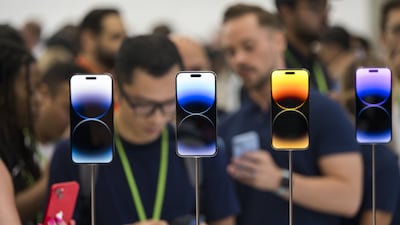The latest iPhone 14 series will boost Apple’s hardware business and help the company to increase its market share and attract new customers, despite economic woes and surging inflation, according to analysts.
The new smartphone models launched on Wednesday include the iPhone 14, iPhone 14 Plus, iPhone 14 Pro and iPhone 14 Pro Max.
“Apple is likely to exit 2022 with its highest ever ASP [average selling price] and highest market share in a decade … expansion in instalment plans and trade-in programmes will further bring in new users,” Tarun Pathak, research director at Hong Kong-based Counterpoint Research, told The National.
“The previous quarter's decline in net profit was due to a challenging business environment, including supply chain and macroeconomic factors … these will ease as we go further. Apple will be least impacted due to inflation and other macroeconomic factors due to the nature of its user base.”
Apple’s net profit dropped more than 10 per cent on an annual basis in its fiscal 2022 third quarter. The company’s net profit in the three-month period that ended on June 25 dipped to more than $19.4 billion, almost $5.6bn less than in the quarter that ended on March 26.
The company is expected to announce its September quarter earnings in late October. Analysts predict a jump in sales as coronavirus-induced supply chain disruptions ease.
“Apple gained significant market share over the past two years as they have completely bucked the global trend during the pandemic,” Annette Zimmerman, vice president analyst at Gartner, told The National.
“Now with the current high inflation impacting consumer sentiment, in the US and Europe specifically, a lot will depend on the price of the new line-up … to help volume, Apple could emphasise their trade-in programme even more so that users can get some discount.”
In 2020, Apple managed to increase its iPhone unit sales by 3 per cent annually while the overall market declined by 15 per cent, Ms Zimmerman said. Last year, Apple's shipments grew by 20 per cent while the total smartphone market grew by only 6 per cent.
Apple, and the premium smartphone segment in general, still has some potential to grow, despite the looming market conditions, Ramazan Yavuz, senior research manager for the Middle East and Africa region at the International Data Corporation, told The National.
“Apple performed well in the recent years in Mena [Middle East and North Africa], despite the world and the region seeing some of the toughest times. This is mainly due to the brand equity and customer preference Apple commands in Mena, aided by the high purchase power in the GCC,” Mr Yavuz said.
He added that the industry is seeing a trend of consumers moving up in price bands to get new smartphone models when possible, opting for longer financing period rather than downgrading their device.
“More financing options are becoming available to consumers such as EMIs, in cases up to 36 months, cushioning the monthly hit to the consumer wallet. Similarly, trade-in promotions for a damaged three-year-old phone make the new device highly affordable for the consumer,” Mr Yavuz said.
The iPhone 14 and iPhone 14 Plus models start from $799 (Dh3,399) and $899 (Dh3,799), respectively, while the iPhone 14 Pro costs $999 (Dh4,299) and the iPhone 14 Pro Max starts at $1,099 (Dh4,699).
Customers will be able to pre-order all four new phones from Friday. The iPhone 14, iPhone Pro and iPhone Pro Max will be available from September 16, while the iPhone 14 Plus will be available from October 7.
There are nice incremental improvements, but nothing earth-shattering, Neil Campling, co-head of Mirabaud Securities' Global Thematic Group, told The National.
“The wider announcement of products is just reflective of supply constraints easing … whereas, the last two years, they [Apple] could only announce products when components were available due to the Covid impacts on supply chains,” Mr Campling said.
“Die hard Apple fans will be happy that there are new shiny products. The majority of consumers will shrug their shoulders … and just take a look whenever they plan to upgrade or replace what they have … iPhone 14 is not getting the latest chip [A16 — that will be in iPhone 14 Pro] … I wonder if this is to keep costs in check.”

Apple stock, which has dropped nearly 14.8 per cent since the start of the year, jumped almost 1 per cent to trade at $155.96 a share on Wednesday at the market close. It gives the company a total market valuation of nearly $2.51 trillion.
The success of new Apple products will depend on two things — the affordability of the lower end products and the scale of upgrade to the upper end, said Craig Erlam, senior market analyst for the UK, Europe, Middle East and Africa at Oanda.
“While that is often the case, the current economic environment leaves little room for error. However, it is certainly a challenging economic environment that will make consumers more wary about splashing out on expensive tech … especially, if that tech isn’t a significant upgrade on what they already have,” Mr Erlam said.























